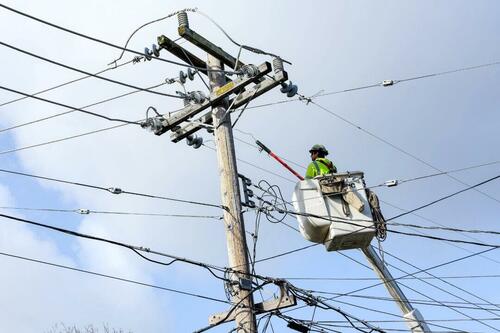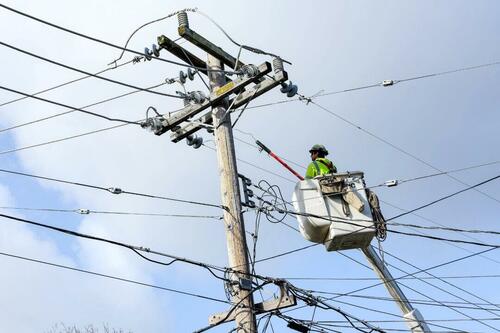
Scammers Are Impersonating Water, Electric, And Gas Companies; BBB Warns
Authored by Naveen Athrappully via The Epoch Times (emphasis ours),
Scammers are impersonating utility company representatives to defraud people by threatening the deactivation of service, the nonprofit Better Business Bureau (BBB) is warning.
 Utility workers make repairs to electrical wires in Guerneville, Calif., on Jan. 9, 2023. (Justin Sullivan/Getty Images)
Utility workers make repairs to electrical wires in Guerneville, Calif., on Jan. 9, 2023. (Justin Sullivan/Getty Images)In utility scams, the criminals “may impersonate water, electric, and gas company representatives, threatening residents and business owners with deactivation of service if they don’t pay up immediately,” an alert issued on June 20 reads.
Typically, the scammers create an environment of false urgency by claiming that customers need to make an overdue payment within the hour or risk having their essential utilities shut down. The frequency of scams increases during certain times of the year, however, according to the nonprofit.
“Utility scams happen any time of year, but will typically pop up during extreme cold or heat events when many people are more likely to need their heat or air conditioning,” the BBB website states.
In some instances, a fake representative may visit a home wearing a lookalike uniform and claim that the electric meter isn’t working properly and should immediately be replaced, according to the BBB’s alert.
Scammers seek entry to homes to perform repairs or energy audits, but with the intent to steal valuables and siphon off “personally identifiable information that just happens to be out in plain sight,” according to the website.
Offering energy discounts is another tactic.
In certain cases, the criminals may attempt to access the homeowner’s electricity account information to switch the service to another utility provider without consent in an illegal practice called “slamming.”
The BBB report detailed an incident in the report: “A lady claimed to be from [company name redacted] and told us our power would be shut off in 45 minutes and we were to call the billing department. [My] husband called the number and they asked for a credit card. He didn’t feel right about it and called [company name redacted] and they said it was a scam.”
The U.S. Federal Trade Commission (FTC) advises people who have been defrauded in a utility scam to report the matter to the utility company, the state attorney general, and the agency via reportfraud.ftc.gov.
Red Flags and Recovery
If a person has already made payments to the scammer through a debit or credit card, they can contact the card-issuing company, notify it of the fraudulent charge, and request a payment reversal, according to the FTC.
The same process can be repeated in the case of a bank transfer, wire transfer, or money transfer; contact the relevant firm and seek a reversal of the transaction.
If the customer paid via cash, the individual must get in touch with the U.S. Postal Inspection Service at 877-876-2455 to have the package intercepted.
Any payments made via cryptocurrency are irreversible, the FTC warns.
“Once you pay with cryptocurrency, you can only get your money back if the person you paid sends it back. But contact the company you used to send the money and tell them it was a fraudulent transaction. Ask them to reverse the transaction, if possible.”
Fraudsters can conduct the utility scam in person, via text, or through a call. The BBB warned that if a caller specifically asks someone to make payment via a prepaid debit card, gift card, wire transfer, or a digital wallet app, this is considered a “huge warning sign.” Legitimate utility firms typically accept a check or a credit card, it said.
Another red flag is if the so-called utility representative puts pressure to make immediate payments, typically within the hour, and engages in intimidation tactics to gain personal and banking information.
In March, Monica Martinez, executive director of Utilities United Against Scams, warned about a new scam trend targeting customers.
“A more recent scam uses fraudulent websites that are identical to a utility payment page and that are promoted on search engines to trick customers into clicking the page and making a payment,” she said.
In April, the FTC charged bill payment company Doxo for allegedly impersonating billers such as utility companies and misleading consumers, while collecting millions of dollars in junk fees.
Tyler Durden
Tue, 07/02/2024 – 19:00
















